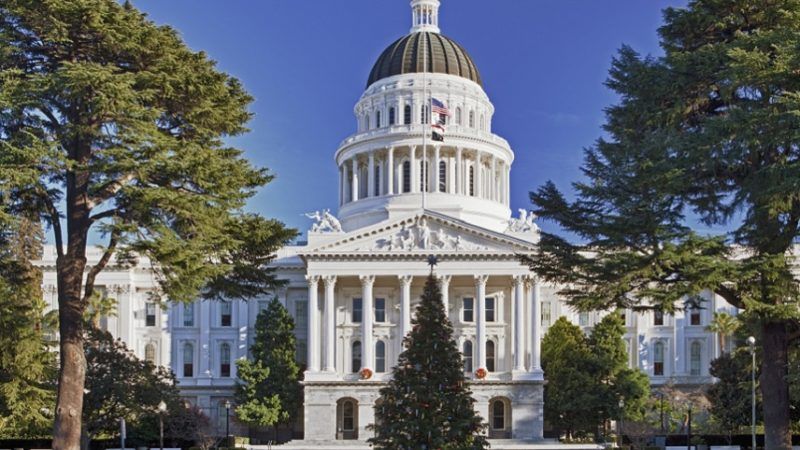What Will Democrats Do With New California Supermajority?
Thanks to an anti-Trump wave that crashed across California in the midterm elections, Democrats will now have legislative supermajorities.

If you needed more evidence that the California Republican Party is for all intents and purposes the equivalent of Monty Python's dead parrot (it's no more, it has ceased to be, it's kicked the bucket, its metabolic processes have stopped, it is pushing up the daisies, it is an ex-party), then take a look at former Orange County Assemblyman and losing GOP gubernatorial candidate Travis Allen's latest "take back California" effort.
Now a candidate for state Republican Party chairman, Allen is promoting a recall of yet-to-be Gov. Gavin Newsom. This is, as a character in the dead-parrot skit would add, "getting too silly." Doesn't Newsom first need to be inaugurated—and presumably do something really bad—before being recalled by the voters that just elected him? Nothing to see in this comedy routine. But if you're serious about California politics, you needn't even think about Republicans.
Thanks to an anti-Trump wave that crashed across California in the midterm elections, Democrats will now have legislative supermajorities. That means they can raise taxes and do as they please without any GOP support. Legislators were in Sacramento this month to get sworn in, but will return after the New Year to begin actual lawmaking. They've already begun introducing bills, which offer some insight into the priorities of the new Legislature.
Expect good news to be thin gruel, but there is at least one decent idea churning. Last year, Sen. Scott Wiener (D-San Francisco) tried to deal with the state's housing crisis by creating a "by-right" approval process for certain types of high-density, transit-oriented housing projects. It didn't go as far as needed, included union giveaways and dealt only with projects preferred by liberal housing advocates, but it would have made it easier for developers to circumvent the Byzantine local planning process.
Unfortunately, Senate Bill 827 died in committee after pushback from local governments and slow-growth activists. But Wiener is back this year with Senate Bill 50. "The heart of the bill is really the same," Wiener said in published reports. "We have a 3.5-million-home deficit in California. It's undermining our economy. It's undermining our climate goals. We have to be bold in solving this problem." Even as housing prices lose steam, California still has a massive affordability crisis. It's good to see this one back on the table.
Wiener, however, also has introduced one of the most troubling housing ideas in these early days of the session. Senate Bill 48 would provide a "right to shelter" for every Californian, which he touts as a means to deal with homelessness—but is an open-ended budget item that ignores the complexities (drugs, mental illness, alcoholism, poverty) of this intractable problem. As the San Francisco Chronicle noted, the measure lacks details "including how much the added shelters will cost, how they will be paid for and who will be responsible for ensuring enough beds are made available." Oh yes, those darn details!
Also on the development front, another noxious idea is making its annual, incremental comeback. One of Gov. Jerry Brown's signature achievements was his dissolution of redevelopment agencies. These were locally controlled state agencies that epitomized crony capitalism and were a relic from the dark days of urban renewal. Cities could plow subsidies into target areas and then grab the ensuing growth in property taxes as values increase, which is known as the "tax increment." Instead of reducing blight, redevelopment became a means to subsidize big-box stores and enhance sales-tax revenue. They often abused eminent domain. Brown and legislators killed them in 2011 because they diverted billions of dollars from the general fund. Now, Assembly Bill 11 would essentially bring them back. No thanks.
What would a legislative session be without the latest attempts to ban a legal product in the name of health or the environment? Six legislators have proposed a state ban on the sale of flavored tobacco products in retail stores and vending machines, echoing bans that have spread across the San Francisco Bay Area. The target is menthol cigarettes and fruity flavored products that supposedly appeal to underage smokers. But because e-cigarettes are defined as tobacco products, and vaping liquids almost always are flavored, it would amount to a de facto sales ban on them.
This is foolhardy. For starters, increasing numbers of smokers are switching to vaping, which British health authorities say are 95 percent safer than combustible cigarettes. So a policy designed to improve public health will reduce the ability of people to switch to a safer habit. Tobacco products of all types are restricted to 21-year-olds in our state. Since when do we outlaw the sales of products for adults to keep them out of the hands of people who are underage?
That idea is almost as silly as the Newsom recall idea, but given that the California GOP is basically an ex-party, it might actually have a chance of passage.
This column was first published in the Orange County Register.
Steven Greenhut is Western region director for the R Street Institute. He was a Register editorial writer from 1998-2009. Write to him at sgreenhut@rstreet.org.


Show Comments (68)